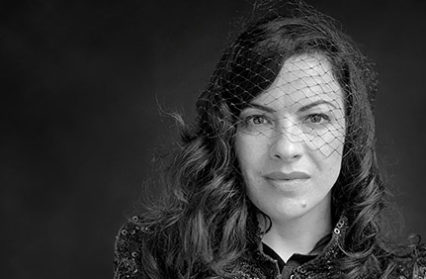Siobhan Denton visits Cardiff’s Festival of Voice for Camille O’Sullivan’s Cave, an interpretation of the work of Nick Cave and The Bad Seeds.
Continuing the Wales Millennium Centre’s Festival of Voice Cardiff, Camille O’Sullivan’s Cave sees O’Sullivan performing various songs from the catalogue of Nick Cave and The Bad Seeds. O’Sullivan, known for her interpretations of such works as ranging as David Bowie, Radiohead and Tom Waits, offers a unique insight into the work itself, highlighting the literary value of each artist’s work, and thus exposing their ability to create a narrative and an authorial voice. Her performance of male artists’ works presents an interesting gender dynamic, compelling the audience to consider both the nature of the music itself and the necessity of its previous gendered performance. O’Sullivan’s very deliberate decision proffers an interesting concept; can a work be reworked, and in turn, reinterpreted by a female singer and in doing so, encourage the work to be reassessed?
These works, so indelibly linked with the male performer, are revisited and represented through a specifically female voice, offering a new method. One that is both almost hyperbolically theatrical, yet personal and intimate, with O’Sullivan carefully, and thoughtfully commanding the stage. This approach renders these hitherto largely male pieces, as new and simultaneously free of their original authorship. This is not to suggest that O’Sullivan disregards the heritage of the work, certainly, her performance pays tribute, but rather, through her understanding and familiarity with the work, she is able to offer a fresh perspective.
O’Sullivan, keenly aware of the dramatic nature of Cave’s work, intentionally plays this up, and audiences are welcomed into the theatre via a wall of smoke. She starts her performance off-stage, her vocals entering the space before she physically does. Once on stage, she stands in a blaze of light, exposing only her silhouette, and therefore, ensuring the focus is on her voice. The Weston Theatre is well-selected, an intimate space that allows O’Sullivan to move forward, closer to the audience when she so wishes, and to move away when intensifying pace and drama. It is apparent that she adopts a persona, one that is changeable dependent on the nature of the song, and her intended rendering and performance. There is something quite notable about watching something that is so intentionally performative, yet does not distance its audience and this is to O’Sullivan’s credit. She is able to successfully balance moments of drama, with humour and pathos in a way that is thoroughly engaging.
The stage itself is largely bare, featuring only O’Sullivan and a few musicians. Much of the drama stems from O’Sullivan herself, and the intelligent use of lighting which O’Sullivan, through various physical gestures, easily and wilfully commands dependent on the mood and tone of the chosen song. She stalks around the stage with purpose and clear pace, hammering her foot on the stage boards for emphasis.
There is a clear sense that O’Sullivan is in charge here, and this is a rendering entirely of her own making. She regularly signals to the musicians when to increase volume, and when to slow pace, and her decision to do so helps create a feeling of an organic performance. While it is clearly well-rehearsed and painstakingly prepared, her control presents the performance as natural, emotive, and entirely of the moment. Her insistence of varying degrees of loudness and quietness, almost as if she composing onstage as she is performing, ensures a clear disconnect from the original creator. Camille O’Sullivan is not simply performing the works of a male creator, but creating something that is clearly of her own intention and making.
Siobhan Denton is a teacher and writer.











